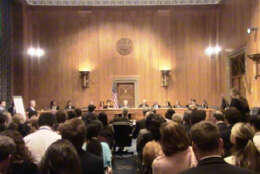GWAC
-
OFPP administrator Dan Gordon told a Senate committee that a new rule to add more oversight to multi-agency contracts should be out soon. Agencies wanting to develop new multiple award contracts will have to justify them before going forward. OFPP is also trying to use strategic sourcing to take advantage of the government\'s buying power.
May 26, 2011 -
GWACs explained by GSA\'s Michael O\'Neill, NIH\'s Mary B. Armstead, and NASA\'s Joanne Woytek
March 18, 2011 -
The FAR Councils issued an interim rule requiring changes to the use of and oversight of interagency contracts. OFPP reports that agencies spent $52 billion on multiple award and GWACs in 2009. The new requirements will help get that spending under better control, the councils say.
December 13, 2010 -
A new report to Congress says OFPP will release new policies this fall to improve the management and use of multiple award contracts. One of the policies will require business cases for all multi- and inter-agency contracts. OFPP found that agencies spent more than $52 billion on these contracts in 2009.
September 22, 2010 -
The GWAC is focused on providing health IT services along with other general technology functions. Vendors must have specific health IT capabilities to bid on the contract. NIH said a small business RFP of the contract will be issued soon.
September 21, 2010 -
Administrator Gordon says strategic sourcing is one way to ensure the government gets the lowest price and to consolidate existing contracts. Gordon also wants agencies to submit business cases for new multi-agency contracts, but doesn\'t commit to asking agencies to justify all types of multiple award contracts.
July 01, 2010 -
Today we get the perspective of former OFPP administrator Steve Kelman.
June 04, 2010 -
Audit agency calls for business cases to justify new multiple award contracts, and a database listing all existing contracts. Sen. McCaskill plans to hold a second hearing on interagency contracting in June.
May 25, 2010 -
Why would an agency create its own multiple award contract rather then going with another contract vehicle -- like one from GSA? Former chief procurement officer Greg Rothwell explains.
May 20, 2010 -
The proliferation of multiple award contracts across the government has reached a tipping point. The Office of Federal Procurement Policy is on a listening tour trying to figure out how to tame this unwieldy beast. In our special report, Contract Overload, Federal News Radio\'s Jason Miller explores all sides of this complex issue. What is the cost to industry to continually bid on these contracts? How do these costs get passed to agencies? Why do agencies believe they need their own MACs instead of using contracts provided by the General Services Administration, or other government-wide acquisition contracts? And, what, if anything, can OFPP do to reel in the explosion in redundant contracts?
May 20, 2010 -
Congressional staff members call the current MAC environment \"chaos.\" The administration will decide in a matter of weeks whether NIH should continue to run its CIO-SP3 governmentwide contract. OFPP administrator Gordon says several broad policy decisions must be made to address the challenges around multiple award contracts.
May 19, 2010 -
DHS, VA say they need their own multiple award contracts because they want vendors who are familiar with their processes and requirements. Others say agencies want the \"glory\" of running large procurements and are unhappy with GSA\'s fees. GSA is trying to address the perception of poor customer service as a way to bring more agencies into the fold.
May 18, 2010 -
GSA looking at Web 2.0, green IT to help agencies, improve services
March 03, 2009 -
CHEERS To the U.S. Postal Service. For the fifth year in a row, the U.S. Postal Service has been recognized by the Ponemon Institute for its best practices in safeguarding U.S. consumers’ personal information among…
January 05, 2009




